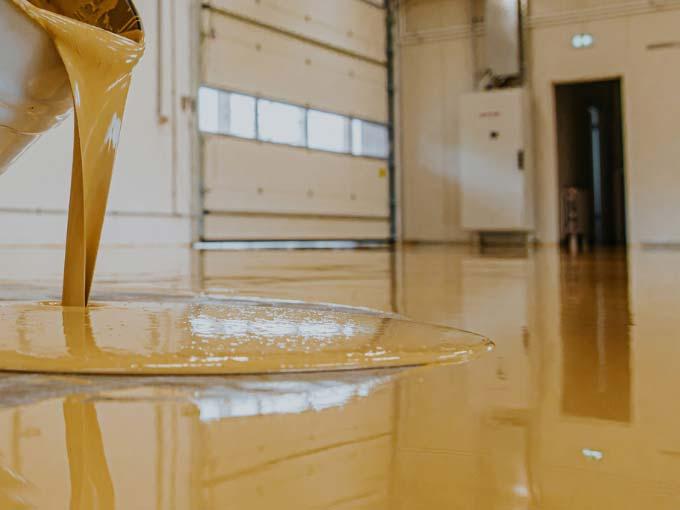Safety Measures During Epoxy Floor Installation Dubai

Safety Measures During Epoxy Floor Installation in Dubai
Epoxy flooring has become increasingly popular in Dubai due to its durability, sleek finish, and ability to withstand heavy traffic, chemicals, and moisture. From commercial warehouses and factories to residential garages and luxury villas, Epoxy Flooring are a practical and aesthetic choice. However, despite its advantages, the installation process involves several health and safety risks that must be carefully managed. The chemicals used, the preparation techniques, and the curing period all pose potential hazards if not handled correctly.
Dubai’s strict occupational health and safety standards, as outlined by Dubai Municipality and other governing bodies, make it crucial for contractors and workers to follow proper safety measures during epoxy floor installation. Below is an in-depth guide to the essential safety precautions that should be observed.
1. Understanding the Risks of Epoxy Flooring Installation
Before diving into safety measures, it is important to understand the risks associated with epoxy resin application:
-
Chemical Exposure: Epoxy resins and hardeners contain volatile organic compounds (VOCs) that may cause skin irritation, allergic reactions, respiratory issues, or long-term health problems with prolonged exposure.
-
Slip and Trip Hazards: Wet epoxy floors can be slippery, posing fall risks to workers.
-
Fire Hazards: Certain epoxy products may contain flammable solvents, especially during the mixing phase.
-
Dust and Particles: Grinding or preparing concrete surfaces produces dust that may irritate the eyes, lungs, and skin.
-
Confined Spaces: Many installations take place in enclosed areas like basements or garages, where poor ventilation increases the risk of inhaling fumes.
Recognizing these hazards is the first step in implementing preventive measures.
2. Personal Protective Equipment (PPE)
The cornerstone of epoxy flooring safety is the proper use of PPE. Workers should never handle epoxy resins without adequate protection. Essential PPE includes:
-
Respiratory Protection: Use half-mask or full-face respirators with organic vapor cartridges to prevent inhalation of harmful fumes. In poorly ventilated spaces, air-supplied respirators may be necessary.
-
Gloves: Nitrile or neoprene gloves protect against skin absorption of chemicals. Latex gloves are not recommended as epoxy can penetrate them.
-
Protective Clothing: Long-sleeved overalls or disposable coveralls prevent skin contact. These should be chemical-resistant.
-
Eye Protection: Safety goggles or face shields protect against splashes during mixing and pouring.
-
Safety Boots: Non-slip, chemical-resistant boots reduce the risk of slipping and protect feet from spills.
Dubai’s safety regulations require that all PPE is inspected regularly and replaced when damaged.
3. Adequate Ventilation
Proper ventilation is critical during epoxy application because fumes can accumulate quickly indoors. In Dubai’s climate, where many projects take place in air-conditioned indoor environments, ensuring airflow can be a challenge.
-
Mechanical Ventilation: Use exhaust fans or air scrubbers to remove fumes.
-
Natural Ventilation: Open windows, doors, and skylights wherever possible to improve airflow.
-
Monitoring Air Quality: Portable gas detectors can measure VOC levels and alert workers if concentrations become hazardous.
Maintaining fresh air circulation protects workers from dizziness, nausea, or long-term respiratory issues.
4. Safe Material Handling and Storage
Epoxy resins and hardeners must be stored and handled with care to prevent accidents.
-
Storage Conditions: Store epoxy chemicals in cool, dry, and well-ventilated areas, away from direct sunlight and heat sources.
-
Segregation: Keep incompatible chemicals separate to prevent dangerous reactions.
-
Labeling: Ensure all containers are clearly labeled with hazard warnings.
-
Spill Kits: Keep spill containment materials such as absorbent pads, neutralizers, and sand nearby.
In Dubai, companies must comply with Dubai Municipality’s Hazardous Materials Storage Guidelines, which regulate labeling, storage temperature, and emergency response planning.
5. Proper Surface Preparation
Surface preparation often involves grinding, shot blasting, or acid etching, all of which pose safety risks.
-
Dust Control: Use industrial vacuum systems with HEPA filters to minimize airborne dust.
-
Hearing Protection: Grinding machines generate high noise levels, requiring ear protection.
-
Chemical Handling: When using acid etching, neutralize and dispose of chemicals safely in compliance with local environmental regulations.
-
Slip Precautions: Wet concrete surfaces can be slippery, so workers must wear slip-resistant footwear.
6. Fire and Explosion Prevention
Some epoxy products contain flammable solvents that pose fire risks. In Dubai, where construction sites often contain multiple combustible materials, prevention is key.
-
No Smoking Policy: Smoking should be strictly prohibited near epoxy materials.
-
Fire Extinguishers: Keep appropriate extinguishers (Class B for flammable liquids) accessible.
-
Static Control: Avoid creating sparks by grounding equipment.
-
Safe Mixing Practices: Mix epoxy in designated areas away from ignition sources.
7. Safe Mixing and Application Techniques
Improper mixing of epoxy resin and hardener can cause dangerous reactions or substandard flooring.
-
Follow Manufacturer’s Instructions: Use correct ratios to avoid excess heat or incomplete curing.
-
Slow Mixing: Avoid vigorous stirring that can release more fumes.
-
Batch Control: Mix small quantities at a time to reduce risks of overheating.
-
Spill Prevention: Work over protective sheets to contain accidental spills.
During application, ensure that workers spread epoxy evenly using recommended tools while maintaining proper posture to prevent musculoskeletal strain.
8. Worker Training and Awareness
Human error is a leading cause of accidents during epoxy installation. Training workers on safety protocols significantly reduces risks.
-
Chemical Safety Training: Workers should understand Material Safety Data Sheets (MSDS) for each product.
-
Emergency Response Drills: Conduct fire drills, spill response, and first-aid training.
-
PPE Use and Maintenance: Teach proper donning, doffing, and cleaning of protective gear.
-
Hazard Awareness: Workers must recognize early symptoms of chemical exposure, such as skin rashes, headaches, or breathing difficulties.
Dubai Municipality mandates that contractors provide regular safety training sessions and refresher courses.
9. Emergency Preparedness
Accidents can still happen despite preventive measures, so preparedness is essential.
-
First Aid Kits: Stocked kits should be readily available, with supplies for chemical burns and eye washing.
-
Emergency Showers and Eyewash Stations: Especially in large projects, these should be strategically located.
-
Emergency Contact Numbers: Clearly displayed for Dubai Civil Defense, ambulance services, and internal supervisors.
-
Incident Reporting: Workers must know how to report accidents promptly for investigation and corrective action.
10. Compliance with Dubai Regulations
Dubai Municipality and Dubai Civil Defense have strict safety and environmental guidelines for chemical usage in construction. Companies installing epoxy floors must:
-
Obtain permits for hazardous chemical handling.
-
Ensure disposal of epoxy waste complies with environmental standards.
-
Conduct regular safety audits and inspections.
-
Keep documentation of safety training and incident reports.
Failure to comply can result in fines, project delays, or even blacklisting of contractors.
Conclusion
Epoxy flooring offers unmatched durability, aesthetics, and practicality, making it a preferred choice in Dubai’s construction and interior design industry. However, the installation process involves significant risks if not managed correctly. Implementing strict safety measures—including PPE use, proper ventilation, safe storage, fire prevention, training, and compliance with Dubai’s regulations—ensures the well-being of workers and the successful completion of projects.Read more visit out site buzzingabout
By prioritizing safety at every stage, contractors not only protect their workforce but also build a reputation for professionalism, reliability, and compliance in Dubai’s competitive construction market. In an environment where quality and safety standards are constantly rising, adherence to proper safety protocols during epoxy floor installation is not just a legal requirement—it is a business necessity.







